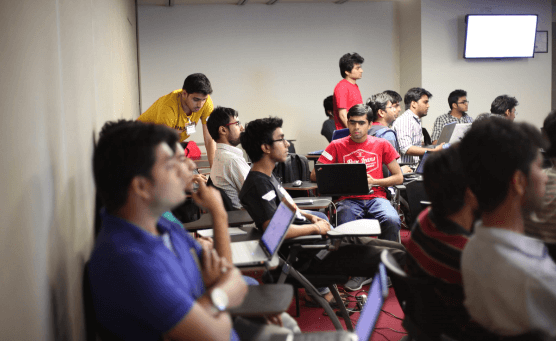Changing the World, One App at a Time

They were everywhere. In groups of all sizes, claiming every corner of the meeting room at the Microsoft R&D Centre in Bangalore. Some had spilled out into the adjacent cafeteria, either typing away in complete oblivion, or hunched in deep conversation. A few others stared into nothing, fingers poised for action on the keyboards. A couple of them sat alone looking so desolate that it made you want to rush to comfort: “Don’t worry, your code will be just fine.” Or whatever worked for them. These were hackers, you see. And we were at a Hackathon.
Knowlarity was one of the sponsors at this two-day Android Hackathon organised by Venturesity. It was called, ‘Get out the vote, Get out the voice’. The participants had to create an Android application in tune with the mood of the nation that was going to the polls. An app that would empower the people and reinforce democracy.
Now, let’s just start by saying if you’ve never been to a hackathon, you’ve missed something. The energy in the room was electric. If you concentrated hard enough, you could probably hear a hum.
Everyone was here to build something unique; change the world, one app at a time. Ideas were exchanged, sold and bought; team members were recruited; individual tasks were assigned. Teams had 24 hours to present the app, that would be judged on the ease with which it could acquire users, robustness of the concept and how popular it was with other participants.
We found Srinivasan Subramanian (known to all as ‘Vasan’), Chief Technology Officer, Accel India, among a group of five sitting in the cafeteria, already at it. Group leader Karthikeyan, from BigO Technologies, was a serial hackathoner, we heard, with at least 10 such hack fests under his belt. “But this is my first hackathon,” declared Vasan, with a childlike enthusiasm that made you want to cheer for him. The other members — Prasanna, Smriti and Ankit – were hard at work.
After due promises of discretion (although Karthikeyan looked unconvinced), Vasan decided to reveal their idea. “A big reason people don’t vote is because they don’t want to stand all day in a never-ending queue.” Through crowd-sourcing, their app would provide real-time information on the number of people waiting at the booth, and directions to get there. We left them to it.
Raj and Dishant sat inconspicuously in a corner. They were part of a team of young guns from the Vellore Institute of Technology (VIT) who were building a forum for voters and politicians to address each other with their concerns and comments. The app would assess the similarity between two comments and prompt users to ‘Like’ other relevant posts, clubbing together similar issues. Based on their popularity, the posts would be passed on for action to politicians or parties who were part of the forum.
Now, here’s another reason it’s good to swing by at a hackathon at least once. Watching these youngsters, barely out of their teens, talk like they’ve got multiple PhDs, takes you back to your own stellar accomplishments from the college days. You realise the only application you ever made over there was with a pen and a paper, and a fake signature of your local guardian (a work of art, nevertheless). More importantly, it worked flawlessly to keep you out of class. How different could these be? Duh.
Raj was still speaking. We quickly realigned facial expression, gave them our best and scuttled off. VIT had three solid teams at the hackathon. One of them won the second prize.
The seven-member Team ‘I Love Bangalore’ was working on a similar project. A few of the members had worked with political parties before and felt that the need of the hour was a two-way communication platform between voters and MLAs. The forum gave politicians a chance to market themselves to the people by talking about the work they’d done or planned to do. The app users would have access to all the information about the leaders in their respective constituencies, and could track progress or hold them accountable for unmet promises.
The winner at this hackathon was a team called ‘The Indifferent’. Their app, Mood Nation, scavenged through Twitter feeds and ran a sentiment analysis to determine which political party or politician had earned the voters’ favour. Simply put, it tracked the Twitterati’s political stand and gave a rough idea of which way the elections might go. Much like opinion polls.
The VIT team that bagged the second prize was called ‘The Innovators’. Their ‘Voice Ur Vote’ app allowed voters to ‘check in’ on Facebook once they had exercised their franchise. Without necessarily revealing whom they had voted for, the app would collate data on which party or candidate got maximum votes and threw up a graph revealing voter sentiment. It also showed which of your friends had voted and allowed you to ‘poke’ the ones who didn’t.
Karthikeyan and Vasan’s team came in third.
It was impossible not to be influenced by the collective optimism of the hackers. If a bunch of young, brilliant minds could make an idea happen in 24 hours, perhaps the future wasn’t as bad as we thought. May be technology could fix what bureaucrats couldn’t. If we had corrupt, indifferent leaders, we also had driven youngsters, barely out of college, who had the tools and the know-how to stem the rot in the system.
If we had corrupt, indifferent leaders, we also had driven youngsters, barely out of college, who had the tools and the know-how to stem the rot in the system.
But why do we need technology to get off our backsides and vote, you ask. It’s what PG Bhat, a retired naval officer, software professional, educationist and social worker, said during a talk at the event. There are way too many glitches in the electoral process today. Mobilising an electorate of 81.45 crore requires more than just raw manpower. It needs a well-oiled machinery that is smart enough to catch and correct errors before they nullify valuable votes. Illegal deletions, duplicate entries, jumbled data and incorrect voter information plague the system. These are usually small errors that have huge repercussions, but nothing a good software can’t fix. Read Bhat’s observations here, to understand the magnitude of this issue.
Written By: Admin

